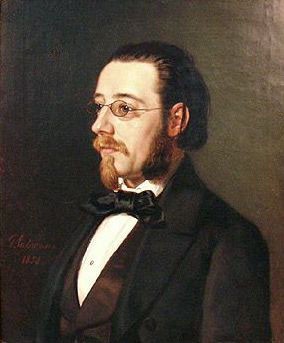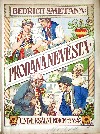James Levine Conducts The Bartered Bride
Juilliard and the Metropolitan Opera Join Forces
By: Susan Hall - Feb 18, 2011
The Bartered Bride
by Bedrich Smetana
Original Czech libretto by Karel Sabina
New English translation by J.D. McClatchy
February 17, 2011
Conductor: James Levine
Director: Stephen Wadsworth
Choreographer: Benjamin Millepied
Set Director: Thomas Lynch
Costumes: Martin Pakledinaz
Lighting: Peter Kaczorowski
Singers: Donovan Singletary, Jennifer Johnson Cano, Layla Claire, Alexander Hajek, Renee Tatum, Alexander Lewis, Paul Appleby, Jordan Bisch, Noah Baetge. Joyce El-Khoury, Elliot Madore.
The Metropolitan Opera and Juilliard got together for a trial run of the future Met production of Bedrich Smetana’s second opera, The Bartered Bride. This preview was not in rough and tumble form, but a full-realized mounting of drama.
Stephen Wadsworth, the director, remarked that the sets had been advanced to pre-World War II Czechoslovakia, but even with peasant costumes and polkas, furiants and skoÄná, the piece feels delightful and timeless.
The opera is sung in English. J.D. McClatchy, a poet, is responsible for the brilliant translation. One day when McClatchy bumped into James Levine at a Met dress rehearsal, Levine said, “I’ve always wanted you to do a translation of Bartered Bride for us.” McClatchy noted that the Met already had a witty one by “a fine English poet.” Levine replied, “I want something warmer.”
Here it is. You didn’t need the super titles, reassuring as they are. The words, sounding comfortable in the voice, are clear as a bell to hear and both witty and moving. This English libretto is one star of the show and sets a gold standard for translation.
Layla Claire, singing the role of the bride to be bartered, displays her unusually luminous, rich voice. She is fully in control of dynamics and comfortably takes a wide range. From her small roles on stage at the Met to her recitals of Mahler’s 2nd, a difficult piece she performed beautifully last summer at Tanglewood’s opening night, Claire is a talent to be reckoned with. She is coming out from under her covers, and will perform in L’Elsir d’amore and the Enchanted Island at the Metropolitan Opera next year.
In addition to displaying her beautiful voice, she clearly enjoys her roles. On what she calls ‘game day,’ she had ‘her guilty pleasure,’ a pedicure and tweeted: 2nd Bartered Bride performance tonight. I love doing this show, it's fun from beginning to end. Thanks Stephen!”
Paul Appleby, her love interest in the opera, has a lovely lyric tenor with a penetrating squillo that suits Smetana’s music. He performs at the Met in Ariadne this spring.
The list of singers on the rise bustles with talent, including Jennifer Johnson Cano, a mezzo, who rose from the Rhine’s waters earlier this fall. Having dropped her mermaid’s tail in Bartered Bride, she is a concerned mom who runs around the stage encouraging her protofeminist daughter to fight back and refuse to marry as settlement for her father’s debts.
The marriage broker, the only character who loses in the end, is a rumbling bass who gets all the Gilbert and Sullivan patter in the production. Jordan Bisch comes to this role from Don Carlos at the Met, and was heard last summer in the Mozart Requiem at Tanglewood.
Joyce El Khoury as Esmerelda is a femme fatale of great charm and lustrous voice.
Small towns are never as nice as we would wish. Smetana knew this well. His family had suffered financial reversals . Smetana wrote in his diary that “By the grace of God and with his help I will one day be a Liszt in technique and a Mozart in composition’. His music studies were threatened by his father’s financial collapse, but he was able to continue when he got a job teaching.
Smetana knew well the pressures of poverty and the demands of debts. He survived to bring to his characters a depth driven by personal experience. He deliberately chose as his librettist a revolutionary who had joined Bakunin. He went to jail for six years. Richard Wagner was exiled for his revolutionary activity at the same time. Composers are ever on the front lines.
Whatever his financial problems, Smetana always loved to dance. He never abandoned his passion for the polka, the furiant and skoÄná. In this production, Paul Appleby, of substantial physical and musical heft, dances with an exuberance Smetana shared, punctuating the musical accents with resounding taps.
Even though the veneer of Bartered Bride is full of folk dance and hooplas, underneath is a story of the impact of money and greed on people. Class problems erupt in the life of Marenka, a beautiful young woman who is being forced by her parents to marry for money because her father signed her over as security on a debt. Marenka is no pushover, her frequent refrain, “I am not going to do what you want.”
The evening gave great pleasure in the moment and high hopes for the future of the form, particularly as its practiced in Lincoln Center. Juilliard is a wonderful incubator for the Met. Scooping up their talented director Stephen Wadsworth to take over Boris Godunov last fall proved to be a brilliant move.
Levine’s standards for this opera are high indeed. His recording of the performance of Bartered Bride he conducted with Teresa Stratas, Nicolai Gedda, Jon Vickers, Martti Talvela is remarkable. Still, as Levine took an now unaccustomed bow on stage, he embraced Wadsworth and Claire. It was clear that the Maestro was pleased with this firmer alliance and we can hope for more wonderful productions from Met/Julliard.
Good news also for the Met which is trying hard to change the profile of an opera goer from the Golden Girls to Katy Perry. The Sharp Theater audience was packed to the rafters with young people who applauded often and LOLed.
Performed again at the Peter Sharp Theater, Sunday February 20, 2011.
Visit www.Juilliard.org for a calendar of future events at the school.
For opera performances in the big house, www.metoperafamily.org.


